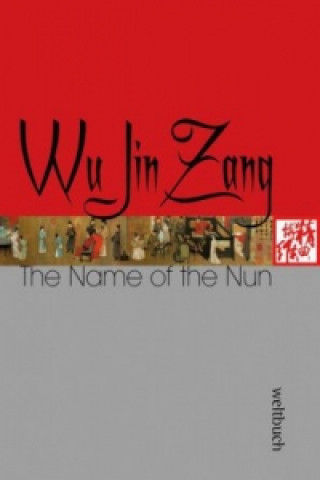
Kód: 02882872
The Name of the Nun
Autor Pang Bei
Although it's known that something is happening, we have no idea what has really happened. They said what was called the end of the world was totally an absurdity as the sun rises as well, and the earth rotates as usual, so go to ... celý popis
- Jazyk:
 Angličtina
Angličtina - Vazba: Brožovaná
- Počet stran: 396
Nakladatelství: Weltbuch, 2015
- Více informací o knize

Mohlo by se vám také líbit
-
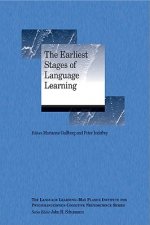
Earliest Stages of Language Learning
1548 Kč -

The Redbreast
192 Kč -

Creating a Data-Driven Organization
878 Kč -

Boost
300 Kč -
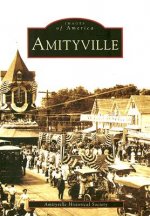
Amityville
656 Kč -
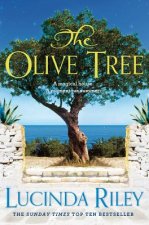
Olive Tree
290 Kč -
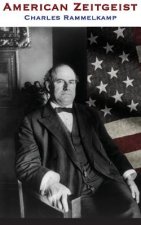
American Zeitgeist
323 Kč
Informovat o naskladnění knihy
Zadejte do formuláře e-mailovou adresu a jakmile knihu naskladníme, zašleme vám o tom zprávu. Pohlídáme vše za vás.
Více informací o knize The Name of the Nun
 Anotace knihy
Anotace knihy
Although it's known that something is happening, we have no idea what has really happened. They said what was called the end of the world was totally an absurdity as the sun rises as well, and the earth rotates as usual, so go to hell the Maya peoples! It is deeply aware that there will be no myth in this world, and the prediction of the doomsday is hated. We are not young any longer so we care about nothing unless concerning ourselves, even the death of a classmate in the old days. At this moment, our faces turned red with wine, and we clinked glasses in the background of light music and flirted in the vagueness of speech. We struggled in the game of time till we achieve a sense of elite now. Spring eclipses her beauty as she is old nowadays. The traces of love everywhere she recalls. Seemingly familiar she is with these willow branches. The veiling branches touch the travelers' heads. These lines came into my mind as I watched these men and women in decent garments in misty eyes by alcohol. It was a fan poem contributed to a palace girl by a last emperor but this moment they came into my mind only because of the death of that classmate. At the time, the waiter opened the last bottle of Sherry and slowly poured our glasses. This chartered room was immediately reduced to a subtle silence. The reunions of old classmates tend to be no more than such: after recalling all nice days in the past and showing off some achievements in numerous overtly or covertly ways, they often make the last moment marked with a special taste. Now we all silently enjoyed such taste, and such a silence needed someone to declare the gathering closed. Among us there are department or division directors, real estate executives, Ph.D. supervisors and celebrities (in this case, I have to arrange them in the conventional order of officials, businessmen and scholars) and in general we were regarded as a successor in this era. For the gathering, we rushed here and would depart in a hurry. At the gathering we have worries on our minds and inquired about each other. In addition, we also subtly avoided the topic of the death in this togetherness until the last moment. This is a gathering of successors, where we just casually talked about fatty liver and high blood sugar and certainly should avoid all disappointing things. At the moment I was not really in a position to speak, but after all I assumed the office of a division-level deputy president of the press. A few years ago I was successfully transferred to serve as an intellectual. Of course my classmates in the astrophysics class have all had their own changes. Now, although feeling a little drunken from drinking alcohol, I was not so foolish as to talk with them about the book publication, because there was the so-called 'expert' who has asserted that ninety-nine percent of the books published nowadays were just like rubbish, not worth reading. We got together at the luxury hotel called " Millenarian Tower ", so we should avoid indecent topics associated with rubbish. And by and large I also agreed to her assertion. Now I strongly felt a need to say something and I had to stand up and speak it out. "Attention, please! I'm sorry! My professional knowledge has been long-abandoned, but I still have a little deep feeling for astrophysics. Just now everyone talked about the crash of a meteorite in Russia, injuring nearly a thousand people there. Of course it's not the end of the world. We can laugh it away and pay no attention to the prophecy by Mr. Hawking on the exodus from the Earth. Hawking said no humans can survive on the Earth in one thousand years, but what I'd like to say is just the event happening a thousand years ago. I have no idea whether you still remember the supernova star 'Star of Good Luck' also known as 'Zhoubao Star', which is the earliest supernova star recorded by humans. Today we are still able to find the 'dispersed smokes' from its explosion, which are light and radio waves coming from a thousand years ago ...... what I'd really like to say is that this star in fact is associated with all of you, which is not only due to our past specialty - the specialty of the professors present, but is also because of the connection of the star with one of our old classmates. Please remember our classmate Xiao Lin, we just lost this good brother. I have to say that his family has an ancient book kept for more than one thousand year, in which there are even some records of this Zhoubo star! What I desire to say is really not about the star, but our classmate Xiao Lin who died many years ago...... " They all stared at me, smiling with a strange look on their faces. They knitted their brows and shook their heads, and then they were all callous and silent. I didn't intend to raise money for the survivors of the deceased classmate but just hoped to remind them of the existence of such a former classmate. Even without any mention of this millennium eternal starlight but even only in memory of an old classmate, how should they say nothing about him? I looked up at these faces shining with fat, and then looked down at the steamed fish on the plate. With white and sharp eyes, the fish remained open-mouthed, looking as if to eat us. Now I felt a kind of coldness coming from top to toe. Turning the head, I looked at the raindrops dropped on the long French window, only to find some strange faces on the window glass: a cold-blooded person's face, an amnesiac person's face and an autistic person's face. "Good, a millennium ancient book! Maybe it's worth 100 million yuan!" said the most prominent student when he got up and proposed a toast, facing everyone, "Good luck! I'm sorry I have to leave and attend a ministry meeting. Everyone, see you all the next year!" "We also have to go now, and Beijing classmates we can get together at any time. Goodbye, everyone!" "Goodbye! More contact! Good luck!" A thousand years are enough time to witness the diversion of rivers and the extinction of species. Man-the wisest of all creatures still makes little progress in this regard in spite of the flourishing science and technology. When making this remark, I came to realize that I had absolutely gotten away from that group. I have been among them for many years. I heard a cracking sound from clinking glasses, which indicates a resolution and rupture. At that moment and at the instant of the collapse of the world, I came to see another side of life. From then on, I will never throw burning cigarette butts into the flower pots, because I don't want to burn any live ant or the grass growing beside the flowers. Those ants and grass have become part of my destiny. By the chance of fate, my neglect and cold-bloodedness lead to the death of that old classmate. I would like to demonstrate his presence in this world. Moreover, I will try to prove his ever presence and then obtain some significance in the rest of my life. The heartrending scene is never forgotten: in the dark night his bloody corpse flowed downstream along the river and those papers were scattered and floated on the water... After the forty-nine days went by, I still had no courage to imagine that real scene occurring on the rainy night. That real sound was heard about half a year ago. That day I attended a dinner party just as usual but suddenly my mobile phone rang in the boring dinner. It's from Xiao Lin my old classmate. Xiao Lin was rarely mentioned in the circle of Beijing classmates. Twenty-four years ago he left Beijing to make a living in another city. Since then almost no news came from him. Some people said that time and space could widen the gap between people, but I believe it is individual situation that accounts for the real reason. We all know those classmates making no achievements will get out of our circle sooner or later. When Xiao Lin was admitted into the university at the age of 14, he was the youngest classmate in our celestial class. But he lost his secure job a few years after graduation. Early years there was some news about him. He initially worked as a teacher at a middle school at his hometown in the South, and later resigned the job and adopted a group of stray dogs. As for the source of his income after the resignation, it's much simpler than we imagined. At that time there were large tracts of woods in the suburban, with an abandoned log cabin. That cabin became his shelter. Although Xiao Lin tutored children in physics and English, his income from this was by no means lower than that from working at a school. In addition, it's said that sometimes he also translated some technical information for additional revenues. That cabin and the woods became the children's classroom. Reportedly, Xiao Lin opened up a vegetable garden and also personally planted an apple tree at the area surrounding the cabin. After the sad news came, I once tried to piece together a living picture of the old classmate but what I could rely on was just the limited hearsay. Is that a Thoreau-like reclusion? Is that a platonic classroom? Is an astronomical telescope installed on the top of the wooden cabin? However, it's a blur picture, most of which is blank. The character in this picture seems like only a mirage. Our last meeting was in the late autumn in the 1980s and thence almost there has been no contact between us. The voice in the phone was strange but familiar, which was obviously no longer the voice of the young Xiao Lin aged 23 but was really from Xiao Lin. On the side of the phone I was of course not what I used to be. I have long been accustomed to the snobbishness of making friends. Just when recognizing his voice, I already adjusted my tone of voice not because of the time span of more than twenty years standing between us. To be honest, at that moment I felt the huge distance between the school and the society, for I was having a dinner with some prominent figures in the capital city, but I heard a burst of dog barks coming from the other end of the phone. On the phone, Xiao Lin said that the clan head left him an ancient book before his death, which was originally a volume secretly kept in the genealogy. Xiao Lin is from Jianyang Fujian Province and the Jianyang Lin Genealogy manifests that Xiao Lin family's ancestor is Lin Renzhao, a famous general in the Southern Tang Dynasty and he is the thirty-third generation descendant of Lin Renzhao. Xiao Lin said that he had requested the leading experts from Ancient Book Division of National Library of China to make the identification and the experts unanimously confirmed that the volume of the ancient book is the "Masha Version" (works printed in Masha Town) engraved in the Ming Dynasty. Furthermore, Xiao Lin said that the masterpiece "The Name of the Nun" contained tens of thousands of ancient Chinese characters and it took him about six months to literally translate them into the modern vernaculars. He specially emphasized "the literal translation," and explained that as a descendant he didn't dare to make improper embellishment to the book, for it can be said to be "a faithful historical account." Now, recalling the first phone call in six months ago, in fact is due to my research lasting for more than one month. In the conversation with him, I did not even understand the term "Masha Version". Actually when talking with him on the phone, I was already a little unpleasant. However, our Press is a national-level publishing house, so I have long been accustomed to the humble tones of those people begging me to help publish their books. But Xiao Lin revealed a calm and confident tone of voice, showed no necessary humility in the dialogue, and even played a joke for my ignorance. Fortunately, after experiencing a great deal in these years I have shaped some virtue of patience. Even if I had no interest in his long speech, I still politely asked him to mail the manuscript to me. How poor a little brother, he even failed to identify my neglect and indifference! I did not bother to ask him, since you invited the expert of National Library of China, then he definitely came to Beijing with the original book, then why did he come and visit me his Elder Brother? Later, the manuscripts were soon delivered to me by EMS, consisting of a printout of the translation version, a set of the copies of the original text of the original book, and several copies of testimonials issued by some experts. I only glanced at them before returning them into the mailbag. At that time, it's a crucial time for me to be promoted as Deputy President. So, all readers, you can imagine, how could I bother to read these manuscripts and consume my time for them? Three months later, Xiao Lin sent me another express mail, which was a long textual research report compiled by professors of the Department of History in Nanjing University on The Name of the Nun that was about historical facts in the last years of Southern Tang during the Period of Five Dynasties and Ten Kingdoms, covering major events such as current affairs, military affairs, court decrees and memorials to the throne, as well as trifles like locations of streets and lanes, folk customs and local products, with descriptions consistent with the reality of the special time of the Sixth Year of the Kaibao Period (973 C.E.). Even the Maitreya Statue described in the book was of the original appearance of Maitreya before the sinicization of Buddhism. In summary, authoritative experts had fully confirmed the truthfulness of this ancient book. That night, Xiao Lin called me again, when I was amusing myself watching TV. Xiao Lin first confirmed that the express mail had been delivered and then talked about his thoughts about the book. Suddenly caught by a nameless fidget, I said that I was busy. He answered he would call again when I was done. I said thoughtlessly that I would be free two hours later. Two hours later, Xiao Lin called again. Outdoor noises could be heard on the phone. He said that as I postponed the calling time, he 9 went to town to buy something, as it was said in the weather report that there would be thunderstorms in a few days. This time, his tone was obviously more respectful. He said it was indeed difficult to imagine that as early as one thousand years ago someone had built a pontoon bridge across the Yangtze River and what a heroic undertaking that was! He said that Xu Xuan's chess book mentioned was actually the first work on chess war in the history of weiqi, and that the story of the nun Master Geng was also backed up by the Painting about Master Geng Refining Snow collected in the Palace Museum in Taipei. He also mentioned a masterpiece of Zhou Wenju in Southern Tang, the Painting on a Weiqi Gathering in Front of a Double Screen, saying that the book revealed that the painting in the Palace Museum of Beijing was very probably an imitation, while the one in the Freer Gallery of Art of the United States was the genuine copy.... During the three months from the receipt of his manuscript to his second call, I did not have a peep at his manuscript at all. In fact, I could no longer find his manuscript, and I was too lazy to look for it, or too busy to care about it. He suddenly cut off, saying that he would call another day and that "something seems to turn up ahead". While I was lazy and busy, the hand of fate sped up the watch hand in the dark. One day after over one month, I unexpectedly received a call from a press in Shanghai. The colleague who called spoke without due civility in a voice of apparent anger. He said that Xiao Lin was murdered on his way delivering the manuscript to Shanghai. Apparently, Xiao Lin no longer entertained any expectation of me. Upon invitation, he went to Shanghai with the original book and his translation, as well as the expert testimonies of Nanjing and Beijing. He was attacked by an overflowing river. He jumped into the river after receiving several cuts by a sword. The pages of the manuscript were scattered in water. As the current was swift, the police failed to find his body and only found several pages of the ancient book among water grasses.... Had I not postponed my talk with him on the phone, Xiao Lin would not have happened to see the scene of forced demolition of a house and grinding over a person (that was an old ancestral residence), would not have become a witness of that homicide case and would not have incurred his own fatal disaster; had I taken initiative to communicate with him, the second talk would not have taken place at such a time as a midnight; had I read over the manuscript in time, he would not have had to deliver his manuscript to Shanghai and would not have died in that river.... Full of guilt, self-reproach and pains, I spent three hours searching for Xiao Lin's mails from my pile of book manuscripts. I read through the translation at one go by staying overnight, and then spent half a day comparing it with the dozens of pages of the original text.-- -I could hardly express the shock and surprise that it brought to me. My heart, which had been numbed for such a long time, throbbed mysteriously. On the title page is quoted a line of Siegfried Sassoon, a favorite line of Xiao Lin in his college years, "In me the tiger sniffs the rose." The ancient text on these pages photographed is the surviving original text. In terms of style, the text seems to follow the biographical history of Sima Qian. In terms of subject, it resembles the legends of the Tang dynasty. The earliest "vernacular stories" in China were produced in the Northern Song dynasty. Legends of Tang before that were all written in classical Chinese. As Classical Chinese and modern Chinese are not distinctly different, Xiao Lin only gave a minimum rendering of the original text, which may be called a kind of paraphrase. Though the original text has no punctuation, the translation does not venture to add any sentence. I stared blankly at the appraisal reports of ancient book experts, including one page I missed in the past, that is, an appraisal by Mr. Shen Jin, former Director of the Rare Edition Office of the Harvard-Yenching Library. Mr. Shen, who has been following Mr. Gu Tinglong, a bibliographer, for over three decades, is a towering figure in the contemporary academic circles of ancient editions. Xiao Lin noted in particular in that appraisal report that upon the first glance over the original text, Mr. Shen concluded in one second according to the paper characteristics and typeface that the book was a "Masha edition" made of bamboo paper at the end of the Ming dynasty. The so-called "Masha editions" mainly refer to books printed in Masha Town of Jianyang, Fujian Province in history. During the Song and Ming dynasties, there were three major book printing centers in China: books printed in Hangzhou were called "Zhe editions", those printed in Sichuan "Shu editions", and those printed in Jianyang "Jian editions", also called "Masha editions". "Masha editions" originated in the Period of Five Dynasties and Ten Kingdoms, prospered in the Song dynasty, culminated in the Ming dynasty and perished in the Qing dynasty. The "Masha editions" in the Song and Ming dynasties were the best and most influential. The number of books printed in Jianyang ranked top nationwide, and thus the place was reputed as the "Capital of Books". Jianyang was also the hometown of Zhu Xi, a Confucian sage of the Song dynasty. It was recorded in history that Jianyang had a long street of 500 to 600 meters, where each household sold books, and numerous book traders came from all over China. Zhu Xi also once opened a store on that street to sell books. An "advertising slogan" is found in his works, "People from everywhere, no matter how far away, come to buy Masha books." Mr. Shen Jin also pointed out in his comment that "Masha books" of the Song dynasty were rare relics now, and though a large number of "Masha books" of Ming were burned and destroyed during the "Cultural Revolution", not a few rare copies were extant among folks, including "official prints", "workshop prints" and "home prints". "Workshop prints" were for sale, while "home prints" were for private collection. The Name of the Nun was a "home print". The Name of the Nun is indeed a "family printed edition" and one volume of Lin's Genealogy in Jianyang. This Masha edition of The Name of the Nun has nine chapters. Chapter IX has a title but no words, while the Ming print still retains its chapter number. The Contents of the Ming print also show that it has a preface, which is missing now. In a copy of the original, the afterword was authored by Qian Qianyi, a leader of the intellectual circle at the end of the Ming dynasty. Qian Qianyi (1582-1664), styled Shepherd and Old Man Yushan. All scholars nationwide, knowing him or not, called him "Mr. Yushan". This "Great Master of the Literary Circles" was celebrated all over the nation for his poems and essays, and was also a historian and collector of unique insight. In his late years, he accidentally got this book, which he cherished all the more, having it re-printed and writing a postscript for it, with two alternative names signed at the end of the article, perhaps because this collector thought that "the book was originally printed by movable types in the Song Dynasty"! Xiao Lin especially pointed it out in his letter, which might be related with the "Nanjing complex". I searched for that "Stone City" (alternative name of Nanjing) among ancient paper-piles, as that was the background of the events and people in The Name of the Nun. With the Yangtze River as its natural moat, the city is located in a strategic place. From East Wu to the Republic of China, the city had frequently been the first choice of capital city for those vying for power or content to retain sovereignty over part of the country. The Qinhuai River goes west, while the Yangtze River runs east. Today after one thousand years, the seven-tier stupa on the Qixia Mountain still retains its appearance after the reconstruction by Lin Renzhao. That is also the tallest stupa in China today. On the stupa is still inscribed a famous Buddhist verse in Diamond Sutra: All is conditioned existence ephemeral,Like a dream,an illusion, a shadow and a foam, Like a tiny dew drop or a flash of lightning, That's the way that everything goes." All are like shadows and foams, so is history. The Period of the Five Dynasties and Ten Kingdoms between Tang and Song, what a mess China was then! The last dynasty of the Five Dynasties was the Later Zhou Dynasty, and the most prosperous of the Ten Kingdoms was Southern Tang (937-975). From Liezu who proclaimed himself king to the surrender of Houzhu to the Song Dynasty, Southern Tang had three generations of kings, First King, Middle King and Last King, lasting for less than four decades, comparable to China's earliest empire: The empire of the First Emperor of Qin lasted for only fifteen years! But the truly comparable point is that both the Qin Dynasty and Southern Tang were overthrown after three generations. "What is a similar situation like the before! Who would care about the Buddha?" The ancient poet Lu Fangweng also exclaimed in his History of Southern Tang as follows, "Tang, which occupied the Yangtze River and the Huaihe River, had a larger area and more powerful resources than other regimes. In addition, thanks to numerous talents and a strategic position in the Yangtze River, it was obviously a large country. If it used the right talents to conquer Min and Chu during their turmoil, then took Wu and Yue, and went down the Five Ridges, uniting the south and the north to form a large kingdom, the Central Plain, though overweening, would not have defeated it so easily!" "Past sages often exerted themselves, concerned with the state and not seeking self-interest. Extensive reading acquainted them with events of 1000 years and people of remote antiquity." Among the many factors that could have changed the destiny of Southern Tang, a critical figure was Lin Renzhao, who for Southern Tang was just as Yuan Chonghuan for the Ming dynasty. They were both "Great Wall for the country", but last kings were wont to "destroy the Great Wall by themselves". Lin Renzhao (?-973), a famous general of Southern Tang, was a native of Jianyang. The Lin's Genealogy in Jianyang had Lin Renzhao as the ancestor, and The Name of the Nun is about the catastrophe in the mid autumn of the sixth year of the Kaibao period. The name of the narrator in the original work is unknown, but his identity is undoubtedly Lin Renzhao's son. In terms of age hierarchy, he should be the second generation in this Lin's genealogy. His name should be available in the genealogy, but unfortunately the words in this part are vague and cannot be identified, as the page is full of fingerprints and dark bloodstains. History only engraves the list of victors, while the truth is found in the crevices of lies and individual memories. In the words of Walter Benjamin, this work displays the "personal experience from far away", a "scene of fate". This scene is shrouded in a gloomy, cold and frothy haze, and I see its re-appearance in the haze and mirage. Scientists say that the Fukushima Earthquake shortens the time of auto-rotation of the earth. In the postscript of The Name of the Nun, the ancient also lamented that "the days and months go by more swiftly". The verification in the unseen world gives me the creeps! A manuscript that has been buried in dust for one thousand years, and a privately collected "faithful historical account" are the predestination and truthful depiction of the state of Southern Tang, and the prophesy and miniature of all dynasties. People were gone, while books stay, which is the destiny of books, and also of people. Xiao Lin said that he saw his own shadow in the mirage of ancestors. This was actually a great reincarnation. He said that his ancestors' aspiration was his own, and that his ancestor's work was his own. He said he would bear witness to both the history and himself. Someone has noted that all rivers belong to one river, and I would say that all deaths amount to the same end. A book is no more important than a person's life, but now that Xiao Lin's life is gone, this manuscript bears evidence to the fact that he once lived. While I bear witness to Xiao Lin, I also prove my presence. Fate fiddles with mortals, including silly people like me. In my dull imagination, Childe Lin just presents Xiao Lin. What kind of heredity will the millennium's gene of a family be like? I have seen the coincident images in a vision of infinite time and space, which are the true images I get. Such a precise sense of reality is just like the book on my desk. What I know about the story of poor Xiao Lin is only such hearsay and impressions, in addition to these broken memories. I should have paid a visit to that small city in the south. But my top priority after just recovering from a dangerous illness is to acquaint more people with this book. Considerate readers may forgive me and even thank me. I share this story with you in order to rescue a kind of memory, which is in fact also our only way to resist amnesia. As to this little brother of mine, it would be impossible for you to grudge your sympathy for his personality and lot; after reading his book, it would be impossible for you not to be affected. As the editor of this book, I naturally feel awed and treat it with fear and trembling. Xiao Lin did not add a line in translating the book; I was even more deterred from altering one word. I am deeply convinced that a good book lasts longer than a person's life. I want to cast my own shadow on this work which is expected to stand the test of time. As preface, afterword and comments were taken advantage of by ancient people to leave their names, I attempted to add an editor's note to the text. Life cannot p
 Parametry knihy
Parametry knihy
- Plný název: The Name of the Nun
- Podnázev: Wu Jin Zang
- Autor: Pang Bei
- Jazyk:
 Angličtina
Angličtina - Vazba: Brožovaná
- Počet stran: 396
- EAN: 9783906212234
- ISBN: 3906212238
- ID: 02882872
- Nakladatelství: Weltbuch
- Hmotnost: 650 g
- Rozměry: 210 × 148 mm
- Datum vydání: 18. December 2015
Oblíbené z jiného soudku
-

Dune
216 Kč -

Haunting Adeline
621 Kč -

Berserk Deluxe Volume 2
1092 Kč -

White Nights
89 Kč -

Powerless
268 Kč -

Atomic Habits
330 Kč -

Dune Messiah
228 Kč -

Berserk Deluxe Volume 3
1142 Kč -

One Day
221 Kč -

Berserk Deluxe Volume 1
1115 Kč -

Iron Flame
368 Kč -

Surrounded by Idiots
213 Kč -

Harry Potter and the Prisoner of Azkaban (Minalima Edition)
993 Kč -

Gravity Falls Journal 3
443 Kč -

Heaven Official's Blessing: Tian Guan Ci Fu (Novel) Vol. 1
440 Kč -

The Creative Act
568 Kč -

Dune
276 Kč -

Hunting Adeline
624 Kč -

A Little Life
290 Kč -

Children of Dune
230 Kč -

Heaven Official's Blessing: Tian Guan Ci Fu (Novel) Vol. 2
427 Kč -

Bungo Stray Dogs, Vol. 8 (light novel)
383 Kč -

Percy Jackson and the Olympians 5 Book Paperback Boxed Set
944 Kč -

Solo Leveling, Vol. 1
440 Kč -
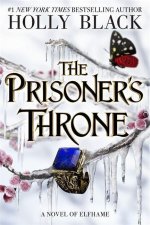
The Prisoner's Throne
247 Kč -

Court of Thorns and Roses
268 Kč -

Cry Baby Coloring Book
276 Kč -
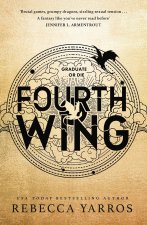
Fourth Wing
407 Kč -

Icebreaker
199 Kč -

Berserk Deluxe Volume 6
1089 Kč -

Avatar, the Last Airbender: The Kyoshi Novels (Box Set)
986 Kč -

The 48 Laws of Power
601 Kč -

House of Leaves
611 Kč -

Twisted Lies
213 Kč -
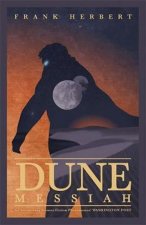
Dune Messiah
272 Kč -

No Longer Human
359 Kč -

48 Laws Of Power
331 Kč -

Twisted Games
213 Kč -

Caraval Paperback Boxed Set
902 Kč -

Solo Leveling, Vol. 2
468 Kč -
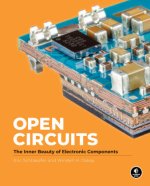
Open Circuits
907 Kč -

Berserk Deluxe Volume 5
1119 Kč -

Heaven Official's Blessing: Tian Guan Ci Fu (Novel) Vol. 3
476 Kč -

Berserk Deluxe Volume 4
1125 Kč -

Court of Mist and Fury
206 Kč -

SOLO LEVELING V08
436 Kč -

English File Upper Intermediate Multipack A (4th)
531 Kč -

CHAINSAW MAN V14
251 Kč -

Before the Coffee Gets Cold
184 Kč
Osobní odběr Praha, Brno a 12903 dalších
Copyright ©2008-24 nejlevnejsi-knihy.cz Všechna práva vyhrazenaSoukromíCookies



 Vrácení do měsíce
Vrácení do měsíce 571 999 099 (8-15.30h)
571 999 099 (8-15.30h)